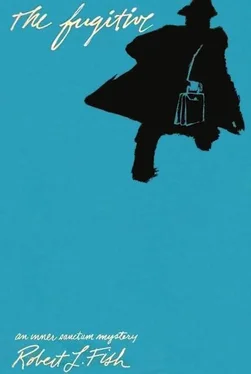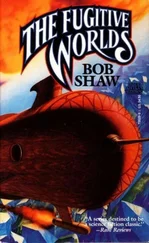The Fugitive
Robert L. Fish
Introduction and Rondo Militaire
The first time Erick von Roesler saw Brazil was in June, 1939. He crossed on a special summer cruise of the Hamburg Line, ostensibly the managing director of a large company manufacturing agricultural machinery. He dined at the captain’s table, contributing little to the stilted conversation, watched the swimming pool antics from the lonely height of the deck rail above, the evening dancing from a comfortable chair in one corner of the spacious salon, and spent most of his deck hours either calmly contemplating the pulsing sunlit waves, or jotting notes in his voluminous diary.
They docked at Rio de Janeiro on a cool misty morning, with the famed heights of the city lost in a bank of fog that blanketed the mountains and drifted down to muffle the waterfront sounds and clothe the tall buildings with eerie mystery. The ship was scheduled to spend a day in port, unloading machinery from Europe, wines from the Rhine and the Madeiras, tin plate from Spain, and all the miscellaneous welter of cases, casks, boxes and crates that make up the lifeblood flowing along the arteries of commerce. Von Roesler spent the greater part of the morning on deck, leaning curiously over the rail as disembarking passengers dashed back and forth, screaming to their friends on the dock below, or brusquely commanding blue-jacketed porters doubled under towering loads of luggage. His shipboard acquaintances would trot up for a hasty goodbye, a self-conscious handclasp, and immediately forgetting him, dash down the gangplank to be kissed by women and hugged fiercely by men clustered on the dock. Children indeed, he thought, with some satisfaction; children indeed.
The fog was burning away and the sun now glistened from the white buildings and lit the bay. The giant cranes creaked and groaned as they dipped their snouts into the hold, swaying gently under the tension of the rising loads, and laying them gracefully upon the cobblestones of the dock. People below ran back and forth, searching the railing for familiar faces; a vendor of pineapple had opened his stand at the foot of the gangplank, and was busily slicing his wares and spreading them out. The purser, a hulking blond man in his late twenties, leaned on the rail beside von Roesler, frowning.
“A circus!” he said bitterly. “What we load in Hamburg in four hours, we must fight in order to unload in a full day here!” He pointed below; a playful wrestling match had developed among the stevedores, laughter rose from the group. Some had gone to the pineapple stand and were eating and talking; the crane-load waited patiently for someone to unhitch the ropes. “Schnell!” the purser screamed, leaning over the rail perilously. No one paid any attention; the purser slapped the rail in disgust. “Brazilians!” he said bitingly, and stamped back to the hold cover shaking his head.
After lunch von Roesler carefully locked his diary away and left the ship to walk about the nearby streets. The tropical sun burned, even in the winter month of June. He was sorry he had come with vest and jacket, but reminded himself that a person in his position could scarcely appear otherwise. He also reflected that his regular uniform would have been even more uncomfortable. The beggars about the Praça Mauá instinctively withdrew their hands as he passed. They knew authority and coldness when they saw it, as well as the futility and danger of importuning such authority.
He crossed the bustling square and walked slowly along Avenida Rio Branco, staring curiously in shop windows at the myriad temptations for tourists there; the butterfly trays, the inlaid cigarette boxes, the badly tinted postal cards, the rough wood carvings, the colorful handkerchiefs printed with scenes of the beaches, of swaying palm trees, of Pão de Açúcar and Corcovado, of all gay Rio de Janeiro. The broad sidewalks were crowded; people pushed past him, jostling him as he stood and watched the scene. A man, speaking rapidly in Portuguese, waved a fountain pen in his face, obviously attempting to make a quick sale; he turned away, and immediately found himself beset by another with a string of lottery tickets. He shook his head coldly and continued his walk.
The excited chatter from a group at a sidewalk cafe caught his attention and he turned to watch them with interest. This was not the relaxed pause of Paris, an aperitif and a moment’s contemplation of the passing scene; nor was it the calculated minute’s rest with a cool drink of bustling Berlin, when past actions were studied and future ones planned. This had a feeling of now in it; the laughing group flung money on the table, hugged each other enthusiastically, and hurried apart, calling and shouting back over their shoulders. The complete divorce from Europe suddenly struck him; the patterned sidewalks, the predominance of black faces in the crowds about him, the shop windows filled with gay but useless bric-a-brac.
He turned back to the ship, walking slowly, pondering his thoughts. Children, true, and decadent children. But with a certain vitality; yes, a definite vitality. Which someday we shall turn to an advantage, he concluded. For children can be led, and we have the destiny to lead.
He left the ship at Santos early the following morning. His bags, neatly labeled and stacked outside his stateroom door, were marked for storage at the residence of the German consul in São Paulo. He carried with him only a small bag with a change of clothing, and a briefcase with his diary and his papers. His passage through customs was accelerated by the presence of a rigid young man who presented himself on board with a note from the consulate, and who returned immediately aboard ship to handle the transfer of the other luggage.
A car was waiting outside the customs shed, and a chauffeur sprang down to take the bags and open the rear door. Von Roesler nodded to the silent figure within and, closing the door, leaned forward to slide shut the glass partition behind the driver’s seat. They pulled away from the docks, bumping over the rough pavement. It was not until they were through the city and speeding past the banana plantations at the foot of the mountains that von Roesler turned to the silent figure at his side.
“Well?” he asked coldly.
The elderly man beside him, muffled in an overcoat despite the growing heat of the day, smiled wryly. “Not even a ‘hello’ first, Erick?” he asked gently.
Von Roesler clamped his jaws on the first words that rose to his lips; this was no time for temper. To cover the silence that had fallen, he reached over and opened the window a crack. “I’m sorry,” he finally said, forcing humiliation into his voice. “But you know the situation, Uncle Ernst. Or you should. Time is running out, and I have a job to do.” He paused and stared out of the car window. They were climbing the winding road of the mountain, and the ocean was spread below them, a scene of incredible beauty, but he saw none of this. He tried to smile casually, hating the feeling of inferiority, of callowness, that he had always suffered as a child with his father’s brother. He’s a senile old fool, he thought, and I am Erick von Roesler of the SD. “How have you been, Uncle Ernst?”
The old man looked at him sideways, crouching in his overcoat. “Cold,” he answered grimly, honestly.
Von Roesler laughed. “After fifteen years in the tropics? In Brazil? Uncle, Uncle! You were born cold!”
There was a sudden rustling from the other, as if he were attempting to burrow deeper into his overcoat. “Yes,” said his uncle slowly. “You and I. We were both born cold.” He hastened his next words, as if to pass an unpleasant moment. “And how is your mother?”
Читать дальше












